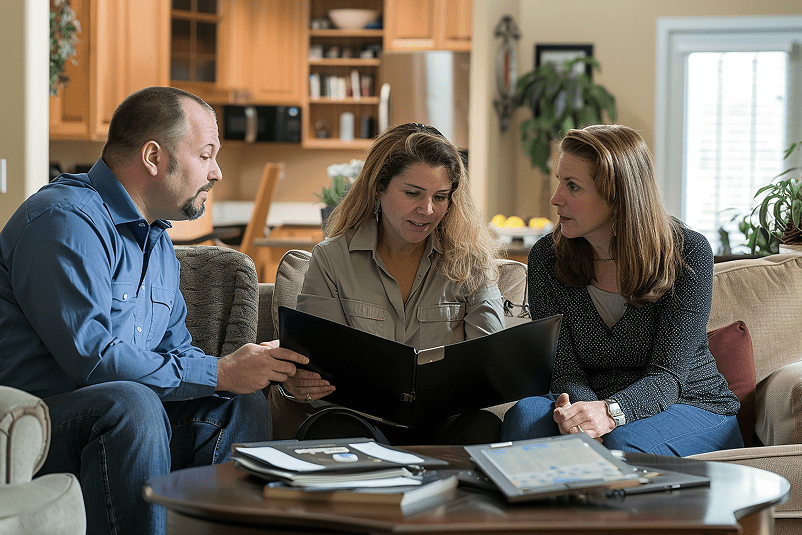Dealing with Missed Payment Mortgages
Can You Still Get a Mortgage?
Missed a payment and wondering if you can still get a mortgage? You’re not alone. Whether it’s a missed credit card, utility, or mortgage payment, many people face financial hiccups and fear they’ll be locked out of the property market. If you miss a payment, it can be reported to your credit file if not rectified within 30 days. Missing a payment can also take your account into arrears and potentially lead to a default after 90 days.
The good news? It’s still possible to get a mortgage, but it depends on what you missed, how many times, how recent it was, and whether you go through a high street lender or specialist mortgage provider.
Mortgage lenders will check your credit history for any late or missed payments before approving your application. Missed or late payments, defaults, or court action show that you’ve had problems in the past, which affects your mortgage application. Most lenders will consider applications with late payments. However, they may require a larger deposit and higher interest rates.
This guide breaks down how lenders view missed payments, the types of missed payments that impact your mortgage eligibility, which lenders may accept you, and how to rebuild your credit profile to qualify for better mortgage deals in the future.
What Are Missed Payments?
A missed payment is recorded on your credit file when you fail to make a scheduled repayment by the due date. The most common missed payments include:
- Credit cards
- Loans
- Utility bills (gas, electric, water)
- Mobile phone bills
- Car finance
- Mortgage payments
Secured late payments, such as those on mortgages or car finance, are viewed more severely by lenders compared to unsecured late payments.
Missed payments stay on your credit file for six years, but their impact decreases over time especially if your finances have improved since. Late payments also remain on your credit record for the same duration, which can influence your ability to secure a mortgage.
All missed, late, or partial payments are recorded on your credit file for at least six years. Creditors may overlook a late payment if it is more than 30 days overdue before initiating further action.
How Lenders View Missed Payments
High Street Lenders
High street lenders (e.g., Halifax, Nationwide, HSBC, NatWest, Barclays) tend to be strict when it comes to missed payments. Most will decline your application if you’ve had late payments on secured debts, such as mortgages, are viewed as more severe by these lenders than those on unsecured debts. A late payment is defined as a payment made after its due date, while a missed payment is one that has not been made at all.
You should contact your lender as soon as possible if you’re struggling to pay your mortgage. Most lenders have specialist support teams that can help if your household income has unexpectedly dropped. You can offer a repayment plan to your lender that includes how much you can afford to pay each month.
- Any missed mortgage payments in the last 12–24 months
- Multiple payments missed on unsecured credit (e.g., credit cards or loans)
- A history of late payments across multiple accounts
They typically require: for
- Clean credit history at least 3 years
- No active arrears or defaults
- Strong affordability and stable income
Missed utility bills are seen as less severe than missed mortgage or loan payments, but repeated missed payments can still reduce your creditworthiness. Lenders must treat you fairly and consider reasonable requests to change your mortgage payments.
Specialist Mortgage Lenders
Specialist lenders are more flexible and are often willing to consider applications with missed payments, depending on the type and timing. These include specialist lenders who may be more willing to provide mortgages to applicants with late payments on their credit report. Many specialist mortgage lenders will work with brokers to help applicants with late payments. Some lenders may allow you to negotiate lower interest payments if you have equity in your property.
- Precise Mortgages
- Kensington Mortgages
- Aldermore
- Bluestone Mortgages
- Pepper Money
- The Mortgage Lender
- Vida Homeloans
- Together Money
These lenders may accept:
- 1–2 missed payments in the last 12 months
- Missed payments over 12+ months ago (even up to 6)
- Historic arrears that have now been resolved
The more time has passed since your missed payments, and the cleaner your recent credit conduct, the better your chances.
How Missed Payments Are Categorised
1. Missed Utility Bills
- Utility providers may not report to credit agencies unless the account is passed to a debt collector.
- Repeated missed payments or unpaid bills that go into default can impact your score.
- Lenders consider them a lower risk than missed loan or mortgage payments.
2. Missed Credit Card or Loan Payments
- These show as late or missed payments on your credit file and affect your score.
- 1–2 isolated missed payments may not be a deal breaker for specialist lenders.
- More than 3 recent missed payments are a red flag for most lenders.
Missed Mortgage Payments
- These are considered the most serious and raise concerns about your ability to repay.
- Many high street lenders will not accept missed mortgage payments in the last 12–24 months.
- Specialist lenders may accept 1–2 missed payments if they are over 6–12 months old and now up to date.
- Lenders typically consider repossession as a last resort and prefer to work with borrowers to resolve payment difficulties.
High Street Lenders – Criteria for Missed Payments
| Lender | Missed Payments Accepted? | Criteria |
| Nationwide | No recent missed payments | 3+ years clean credit history required |
| Halifax | 1 minor late payment >2 yrs OK | No missed mortgage payments in last 3 years |
| Barclays | Very strict | No missed payments clean credit file needed |
| NatWest | 1–2 missed >3 yrs old | Will not accept missed mortgage payments in past 2 years |
| HSBC | No | Clean file only |
| TSB | Limited flexibility | May accept historical missed payments >3 years |
Specialist Lenders – Flexible Criteria for Missed Payments
| Lender | Missed Payments Accepted | Key Notes |
| Kensington Mortgages | Yes – even within 6–12 months | May accept 2 missed payments in last 12 months |
| Precise Mortgages | Yes – depends on product tier | Tiered approach based on severity/timing of missed payments |
| Pepper Money | Yes – up to 3 missed in last 12 months | Will consider applicants with missed utilities, loans, and credit cards |
| Vida Homeloans | Yes – 0–3 missed payments allowed based on credit tier | Accepts satisfied missed payments or older issues |
| The Mortgage Lender | Yes – flexible depending on risk tier | Will assess full credit history in context |
| Bluestone Mortgages | Yes – including unsatisfied defaults | Adverse credit specialists |
| Aldermore | Yes – limited recent missed payments may be accepted | Best for self-employed or complex income + minor credit issues |
Smaller specialist lenders also exist that may manually underwrite your case, particularly through a broker. Specialist mortgage lenders use a more human approach to assess applications. You could consider selling your endowment policy to help pay off mortgage debt.
How to Improve Your Credit Score After Missed Payments
Improving your credit score helps you switch from a specialist mortgage to a high street mortgage in the future, potentially saving you thousands. Multiple late payments, however, lower your credit score, making it harder to qualify for competitive interest rate terms. A higher deposit may be required for mortgages if there are late payments on your record. You might be able to request to extend your mortgage term to reduce monthly payments. You should check if you have mortgage payment protection insurance if you’ve lost your job. You can sell your home to pay off mortgage debts, but you should first seek financial advice.
Best Practices:
- Pay all bills on time going forward even mobile phone contracts.
- Set up direct debits to avoid future missed payments.
- Clear any outstanding arrears or defaults where possible.
- Keep credit card balances under 30% of your limit.
- Don’t apply for too much credit in a short period (space out applications).
- Register on the electoral roll at your current address.
- Check your credit report for errors,use Checkmyfile, Experian, Equifax, and TransUnion.
- Use credit builder tools like LOQBOX, Experian Boost, or responsible credit card use.
- Register on the electoral roll. Being registered to vote at your current address helps lenders verify your identity and shows stability, both of which are positives for your credit profile.
If you are struggling to manage your debts, consider seeking assistance from a qualified debt adviser.
With consistent behaviour, your credit score can improve significantly in 12–24 months, putting you in a better position for a high street remortgage or move.
High street banks often look for a clean credit history over the past 1–2 years, so showing responsible credit use and no recent defaults or missed payments greatly enhances your eligibility.
As your credit score recovers, you’ll likely gain access to more competitive mortgage rates, lower interest, and a broader range of lending options potentially saving thousands over the term of your mortgage and enabling you to switch from a specialist lender to a mainstream one.
Pros and Cons of Getting a Mortgage After Missed Payments
Pros
1. Specialist Lenders Are Available
Even with missed payments on your credit file, there are many specialist mortgage lenders who understand complex credit situations. They assess applications based on overall affordability and recent credit conduct rather than just your credit score.
2. Opportunity to Rebuild Credit
Securing a mortgage and maintaining payments on time can help rebuild your credit profile. Over time, consistent mortgage repayments are a strong positive factor for future borrowing.
3. Possible to Get on the Property Ladder
Missed payments don’t automatically disqualify you from buying a home. With the right advice and preparation, you can still get on the property ladder, especially if your missed payments are historic or isolated incidents.
4. Flexible Lending Criteria
Many non-high-street lenders offer bespoke underwriting, meaning they look at your unique circumstances. For example, one or two missed payments from over 12 months ago may have little impact if your recent conduct has improved.
5. Short-Term Solution Until Credit Improves
You may initially start with a specialist mortgage product at a higher rate, but once your credit score improves, you could remortgage to a high street lender for better terms in 1–2 years.
Cons
1. Higher Interest Rates
Lenders typically see borrowers with missed payments as higher risk, which means you’re more likely to be offered higher mortgage interest rates, increasing your monthly payments.
2. Larger Deposit Requirements
Some lenders may require a larger deposit (e.g., 15–25%) to offset the risk, especially if the missed payments are recent or linked to other credit issues like defaults or CCJs.
3. Fewer Lender Choices
Missed payments limit your access to mainstream mortgage lenders like high street banks, which have stricter criteria. You may only qualify with a select few specialist lenders, which narrows your options.
4. Stricter Affordability Checks
Lenders may apply more rigorous affordability assessments, particularly if your income is variable or you’re self-employed. They want to ensure you can keep up with mortgage payments despite your credit history.
5. Potential Fees and Broker Costs
Specialist mortgage products often come with higher arrangement fees, and you may need a mortgage broker to access them. This can add upfront costs to your home buying process.
Conclusion
Yes, you can get a mortgage with missed payments, but your options depend on the type, frequency, and age of those payments. High street lenders have strict rules, but many specialist mortgage lenders are more understanding and offer realistic solutions.
By working with an experienced mortgage broker, you can match your credit history with the right lender, avoid rejections, and improve your chances of homeownership even after past financial setbacks. You should seek independent financial advice before making mortgage decisions.
If your lender is taking legal action for repossession, it’s still possible to negotiate an arrangement with them. If you can’t reach an agreement with your lender, help from a mortgage rescue scheme may be available.
Get help from an experienced mortgage broker.
You can speak to one of our specialist mortgage brokers who would be able to guide you through the process. They will advise if there is a lender available and the maximum loan amount based on your circumstances. We are a whole of market mortgage brokerage with access to all lenders. Call us on 01332 470400 or complete the form with your details for us to give you a call back.
Why Work with Option Finance for Bad Credit Mortgages?
At Option Finance, we specialise in mortgages for complex credit scenarios. Our team works with all major bad credit lenders and has access to exclusive deals that aren’t available on the high street.
Understanding one’s credit report from a credit reference agency can help in securing a mortgage.
Over 20 years of experience
Full market access to specialist lenders
Fast, honest, and personalised mortgage advice
Expert help with complex or recent credit issues
Showing our favourite reviews

Always attentive, helpful and efficient
Jonathan, 27 Jan 2025

Best Mortgage Broker in the UK!
Liam, 26 Nov 2024

Ben was really helpful in helping me…
George, 28 Aug 2024
FAQs
Can I still get a mortgage if I’ve missed payments?
Yes, it’s still possible. While high street lenders may be stricter, many specialist mortgage lenders are willing to consider applicants with missed or late payments—especially if the issues were minor, historic, or have since been resolved.
What types of missed payments affect mortgage approval the most?
Lenders view missed mortgage or secured loan payments as the most serious, followed by missed payments on credit cards or loans. Utility or mobile phone bill misses are typically seen as less severe—but repeated missed payments of any kind can still raise concern.
Will I need a larger deposit if I’ve had missed payments?
In most cases, yes. Lenders may ask for a larger deposit—typically 15–30%—to offset the added risk. A bigger deposit improves your chances of approval and can help you access better interest rates.
How long do missed payments stay on my credit file?
Missed and late payments remain on your credit report for six years. However, their impact lessens over time—especially if you’ve had no further issues and maintained a clean payment history since.
Which lenders accept applicants with missed payments?
Several specialist lenders regularly work with applicants who have missed payments, including:
- Precise Mortgages
- Kensington Mortgages
- Aldermore
- Pepper Money
- Bluestone Mortgages
These lenders assess each case individually and focus on recent financial behaviour and affordability—not just past credit slips.
Ready to Take the First Step?
Whether you’re a first-time buyer, remortgaging, or moving home, bad credit doesn’t have to hold you back.
Understanding credit scoring can help you prepare for a mortgage application. You can speak to one of our specialist mortgage brokers who would be able to guide you through the process. They will advise if there is a lender available and the maximum loan amount based on your circumstances. We are a whole of market mortgage brokerage with access to all lenders.
































